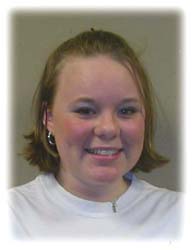EN340
/ IN350 Global Haiku Tradition
Dr. Randy Brooks
Spring 2003 |
|

Chrissy Hulse |
Selected
Haiku
by
Chrissy
Hulse
Author's
Preface
I
can remember sitting at my computer five months ago wracking
my brain to write an original haiku, one that would be unique
and personal, as well as abide by the 5-7-5-syllable principle,
needless to say, that haiku was extremely unoriginal and
boring. I later came to learn that these principles did
not necessarily apply to all haiku poems; in fact not many
writers use it today, however it is still being taught in
the classrooms today. The freedom of haiku today allows
writers to truly make it their own, and to create their
own images without feeling trapped or restricted. With this
being said, I have enjoyed the self-expression and creativity
that haiku offers to its writers, as well as its readers.
Although the poem in itself is rather short and to the point,
the images that they can create are endless and open to
interpretation. These images allow for specific moments,
or broad examples of events or memories that many readers
can relate to their own lives, regardless of where the author
is coming from.
|
Although
it is important to note that not all poems are written
from personal experience, rather many are written from
the author's imagination. I have found that most of my
writing this semester has been taken from my own personal
experiences as a means of self-expression and reflection,
however I enjoy writing them for others to relate in their
own hearts and minds. Therefore, I challenge each reader
to open his or her minds, hearts, and sense of humor up
to my writing, and to simply enjoy it for what it is.
—Chrissy
Hulse
May 7, 2003
Reader's
Introduction
Reading
Chrissy Hulse's haiku is not an out-of-body experience.
It is not magical; nor is life-altering. Instead, reading
Chrissy's haiku is more like a trip down memory lane. The
moments she writes about—from meeting a new sibling
for the first time, to making that long walk down the field
on graduation day—are ordinary events that most of
us have probably experienced at one time or another. However,
the straightforward, simplistic manner in which she presents
her moments is what makes reading Chrissy's haiku a significant
experience.
Her
haiku are simply teeming with emotion, making that moment
come vividly to life for the reader. One can feel the strong
determination mixed with aching heartbreak in "turning
away," or the overwhelming yet deliciously exciting
anticipation in "barefoot in the rain." Perhaps
it is because Chrissy writes mostly out of personal experiences
that her haiku are so infused with emotion, or perhaps that
is just a stylistic choice; however, the sensations and
feelings included in her haiku are what make them appealing
well as easy to relate to for readers. It is in this way
that reading Chrissy Hulse's haiku not only becomes a welcome
voyage into the past, but also an exercise in how to write
excellent haiku.xx
—Alyson
Ludek
|
large
blue chair
father and daughter
silently
side by side
|
|
| |
home
again
no longer
the tallest
|
Easter
dinner—
the frosted lamb cake
decapitated
|
|
| |
feet
in the water
hand in hand
. . . the
endless sand
|
barefoot
in the rain
we confess
those unspoken feelings
|
|
| |
early
spring chills
our gowns rustle
as
we march down the field
|
turning
away
wiping tears
do
not
look
back
|
|
| |
Face
pressed against the glass
staffing at a face similar
to her own, she began to cry,
"but she was supposed
to be a boy!" Stomping
her foot, she refused to spend
anymore time starring at a
baby girl that was not welcome
in her home, as far as she
was concerned. The house was
filled with family members
and friends as her mother
returned home from the hospital,
baby and all. With tears in
her eyes, this young girl
spends her time watching the
celebration from a far, still
upset with her mother and
unforgiving of her new baby
sister. After the visitors
leave her mother asks her
to please help with the baby.
With an unhappy look on her
face she stomps into the babies
new room. As she sits down
her mother places the baby
in her arms, immediately she
falls in love with her enemy.
One smile was all it took
to warm her heart up to this
bundle of joy and love of
her life.
the
baby
embraced in her arms
smiles
for the first time
|
©2003
Randy Brooks, Millikin University, Decatur, Illinois || all rights
reserved for original authors
|